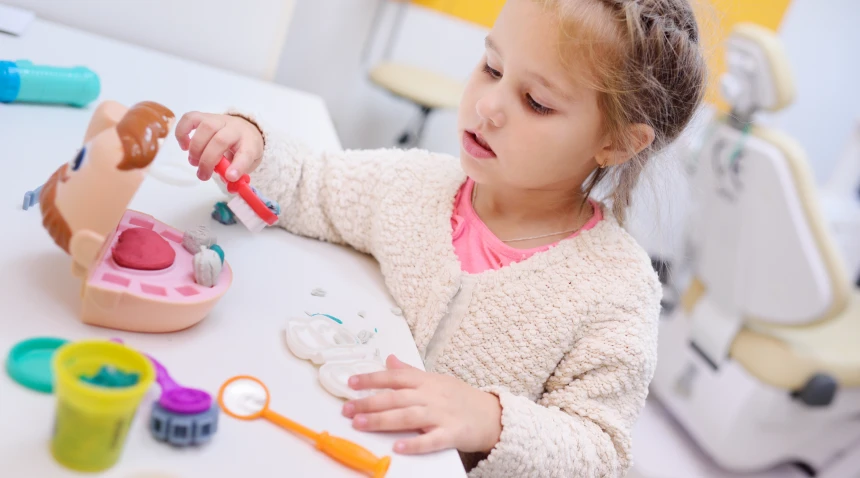Cavity prevention in children begins as soon as the first teeth appear. Cavities are among the most common oral health issues in young children, but they can be avoided through simple daily habits. By establishing good oral hygiene early, monitoring diet, and scheduling regular dental check-ups, it is possible to protect children’s teeth over the long term. These early habits help prevent pain, preserve chewing function, and support harmonious dental development.
Understanding how cavities form
Cavities develop when bacteria in the mouth transform sugars from food into acids. These acids gradually attack the enamel, the tooth’s protective layer, creating small holes. In children, enamel is thinner and therefore more fragile, which accelerates this process. Frequent snacking, sugary drinks, and insufficient brushing greatly increase the risk. Understanding this mechanism helps parents realize the importance of regular dental care.

The importance of brushing from an early age
Brushing is the first line of defense against cavities and should begin as soon as the first baby tooth appears.
To ensure optimal effectiveness:
- Use a toothbrush with a small head and soft bristles.
- Choose a fluoride toothpaste appropriate for the child’s age.
- Brush twice a day — in the morning and before bedtime.
Until around age six, children need adult help to brush thoroughly. The recommended duration is about two minutes. It’s best to follow the same order each time to avoid missing any areas, for example from the upper to the lower jaw, and from the back to the front.
Diet and cavity prevention in children
Diet plays a key role in preventing cavities. Bacteria feed on sugars and produce acids that attack teeth. To limit this risk:
- Offer water as the main drink, including during meals.
- Reserve sugary drinks and fruit juices for special occasions.
- Provide healthy snacks such as fresh fruit, dairy products, or whole-grain bread.
- Avoid sticky sweets that cling to teeth, such as soft candies or caramels.
A regular rhythm of meals and snacks helps reduce frequent acid attacks in the mouth.
The role of regular dental visits
A dental check-up every six months to a year helps monitor tooth development and detect early signs of decay.

Starting from around age two or three, these visits are useful to:
- Check oral hygiene.
- Detect cavities early.
- Advise parents on preventive care.
For children at higher risk, the dentist may recommend preventive treatments such as fluoride varnish application or sealants on molars to protect areas that are difficult to clean.
Education and daily guidance
Good habits are built at home. Parents can:
- Supervise brushing morning and evening.
- Explain simply why brushing is important.
- Set a good example with their own dental hygiene.
Cavity prevention in children also involves education. Reading books or watching educational videos about oral health together can make the topic more engaging for children.
The protective role of fluoride
Fluoride strengthens enamel and makes it more resistant to acid attacks. In cavity prevention for children, it is recommended to use fluoride toothpaste in appropriate amounts:
- For children under 3 years: a thin smear of toothpaste.
- Between 3 and 6 years: a pea-sized amount.
The dentist can determine whether additional fluoride intake is necessary depending on the child’s cavity risk.
Reducing fear of dental visits
For many children, visiting the dentist can cause anxiety. A welcoming environment, a gentle approach, and age-appropriate explanations help reduce this fear. Parents can prepare their child by presenting the visit as a normal part of staying healthy, without dramatizing or using worrying terms. It can also be reassuring to play pretend “dentist” at home to familiarize the child with the steps of a visit in a fun way.

Consistency, the key to good dental health
Cavity prevention in children is not a one-time action but a daily routine. Regular efforts quickly become natural habits. This involves:
- Consistent oral hygiene.
- A balanced diet.
- Regular dental visits.
By integrating these simple practices into daily life, parents can greatly reduce the risk of cavities and ensure their child keeps a healthy smile for many years.
Tailored guidance for every family
Every child is unique, and their needs may vary. The dentist considers age, dietary habits, and daily hygiene to provide personalized advice. This approach helps parents better understand how to protect their child’s teeth based on their individual lifestyle.
Giving your child a healthy start in life
Protecting a child’s oral health means giving them the best chance to grow with confidence, a healthy smile, and proper function. Early dental care and regular check-ups are the best ways to prevent cavities and their consequences.
Cabinet Mirabeau in Paris 16 supports families through this process with special attention to the comfort and peace of mind of young patients, ensuring each visit helps build lasting oral health habits.
You may also like: Oral hygiene